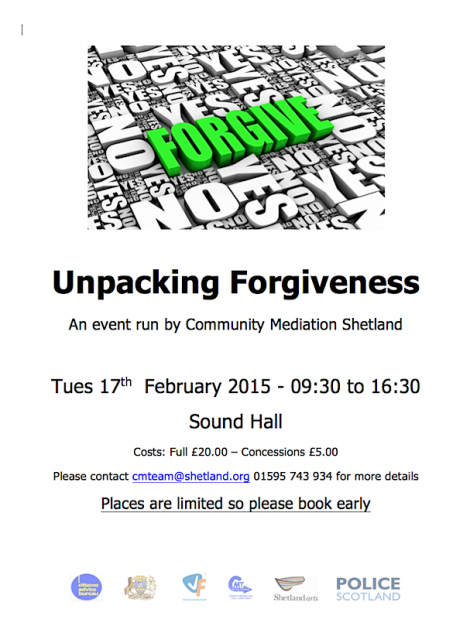News / ‘More than just saying sorry’
It seemed appropriate that a seminar entitled Unpacking Forgiveness happened to fall on Shrove Tuesday, which is traditionally a day of confession and self-examination, writes Shetland News reporter Genevieve White.
The seminar, held in Sound Hall earlier this week, was chaired by council convenor Malcolm Bell and jointly organised by Shetland Arts development officer Clair Aldington and project manager of Community Mediation, Alyson Halcrow.
Twenty-four delegates attended the day’s seminar in addition to 14 speakers and helpers. Delegates came from a range of different backgrounds and included interested individuals, inter-faith representatives, teachers and representatives from the children’s panel.
The seminar started with an exploration of the concept of restorative justice, which was led by Aldington and Halcrow.
Unlike traditional forms of criminal justice, restorative justice seeks to bring the person harmed by crime and the personal responsible for doing the harm into communication.
Thus begins a process, which enables everyone to work together to repair the harm and move forward.
Aldington, who has significant experience of working with restorative justice both in Shetland and on the mainland, stressed the move away from traditional criminal justice terms such as ‘offender’ and ‘victim’ towards less adversarial and more restorative language.
She said: “Restorative justice can occur through conversation, small meetings or large conferences and can even extend to involve whole countries. At its root it is concerned with developing empathy.”
In Shetland 300 adults and young people have, to date, taken part in restorative justice sessions, in projects, which have varied in time scale from six weeks to a year and a half.
However, the future of restorative justice is overshadowed by budget cuts and funding worries: “There are some big questions about how we continue this way of working with people,” Halcrow said.
Delegates then watched a short film illustrating the transformative effect of restorative justice. The Woolf Within tells the story of how experienced burglar Peter Woolf and Will Wiley (who Woolf subjected to a violent attack when his attempt to burgle Wiley’s home went awry) came together to discuss the effects of Woolf’s actions.
Become a member of Shetland News
In this powerful film, Woolf reflects on how, during their initial restorative justice meeting, his “poor old mes and social spiel” gradually gave way to an understanding of the consequences of the damage he had inflicted on others.
Wiley was able to express his own feelings of anger to the person who harmed him, in contrast to the traditional system in which the victim is “the least involved in the process.”
This was followed by another short film in which IRA bombing survivor Sue Hanisch spoke of her own journey towards forgiveness.
Hanisch lost her right leg in the bombing attack, and suffered severe permanent injuries to her left foot, as well as to her right hand. Forgiveness for her ultimately meant “putting yourself in someone else’s shoes” and being willing to “hear the other side of the story”.
This opening session, as Halcrow acknowledged, posed more questions than it provided answers: “Is forgiveness part of restorative justice? Should it be? Does forgiveness require the involvement of two people? Can we forgive and forget?”
The presentation on restorative justice was followed by Scottish secretary and local MP Alistair Carmichael’s talk on forgiveness from a political perspective.
This led on to a talk on forgiveness and faith by the Reverend Neil Brice and Father Anil Gonsalvez.
Afternoon workshops offered delegates the opportunity to discuss a range of forgiveness related topics.
Reflecting on the reason for organising the seminar Halcrow said: “We organised a seminar on apology last year and the subject of forgiveness came up then.
“But restorative justice is more than just about saying sorry. After all, we say sorry so many times each day, but how often do we actually mean what we say? So we decided this time we wanted to look at forgiveness as a separate entity from apology.
“This might be something we do annually – attempt to unpack a topic over the course of a seminar. We’ll be asking for people’s suggestions for future topics later on in the day.”
Become a member of Shetland News
Shetland News is asking its readers to consider paying for membership to get additional perks:
- Removal of third-party ads;
- Bookmark posts to read later;
- Exclusive curated weekly newsletter;
- Hide membership messages;
- Comments open for discussion.
If you appreciate what we do and feel strongly about impartial local journalism, then please become a member of Shetland News by either making a single payment, or setting up a monthly, quarterly or yearly subscription.




























































